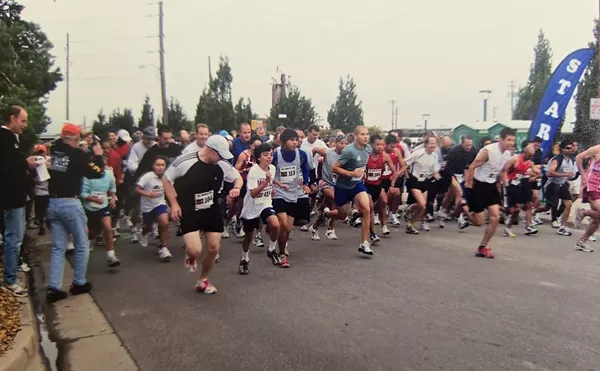Even as the justice system debates whether the confessed wife-beater -- confessed, at least, until Astacio's lawyers realized that their plea bargain could result in the Rockies pitcher (and now hitter) being kicked out of the country -- can withdraw his confession, the same federal law has also grounded 23-year-old Loi Nguyen. But while Astacio has many places to go -- the Dominican Republic would welcome him back, and other baseball-happy countries would kill for his arm -- Nguyen has no options.
He's officially non-deportable. His native Vietnam doesn't want him -- doesn't want anyone convicted of a crime in America.
Nguyen, who left Vietnam at four when his family fled the communist regime, considers himself an American ("Waiting to Exile," January 21, 1999). He doesn't remember anything about his homeland and doesn't want to live there. "But if they could send me to Vietnam, I would go," he says. "That's the result of a choice I made, a mistake I made. If that's my only freedom, I would go. I don't think you can live without freedom. For them to lock me up forever, that's not fair."
And right now, he's facing a life sentence of limbo with the INS. Even though he's done his time and then some. Even though state corrections officials say he's a model prisoner who poses no threat to society. "I don't blame nobody for my crime. I'm not angry with anybody," Nguyen says. "But I paid for it, and I'm trying to move on and do better."
Still, he can't move on. Nguyen's life ground to a halt the day he led Jefferson County cops on a high-speed chase while he drove a restaurant-robbery getaway car. He was fifteen -- too young to be driving, much less driving a getaway car -- but was charged as an adult and found guilty of aggravated robbery. Sentenced to thirteen years, he did half that. "I turned sixteen in the Jeffco county jail," he remembers. "I turned eighteen in the DOC, twenty-one in the DOC." And then, in August 1997, the state decided he'd served enough of his sentence and granted him parole.
But Nguyen didn't get out. While he was in prison, President Bill Clinton had pushed through the Illegal Immigration Reform and Immigrant Responsibility Act of 1996, which requires deportation of immigrants convicted of crimes ranging from manslaughter to domestic violence to aggravated robbery. And if there's nowhere for those immigrants to be deported to, they can be held by the INS indefinitely.
"The day I was supposed to be released early for good behavior," Nyugen remembers, "the INS showed up." They took him to their Wackenhut facility in Aurora and told him that as soon as Vietnam allowed people to go back, he'd be on the first plane. But Vietnam wasn't allowing anyone to go back, and so Nyugen celebrated his next birthday in the INS detention center.
His lawyer, Jim Salvator, filed suit, arguing that such incarceration was unconstitutional. And finally last April, after he'd spent seven years -- a third of his life -- behind bars, Nguyen was released on bond pending a decision by the Tenth District Court. "I hadn't been out since I was fifteen," Nguyen says. "I got in the car. My aunt handed me a phone; I didn't even know how to use it. Everything was so surprising. My knees were shaking. When you're like an animal in a cage for so long and suddenly you're free, you don't know what to do."
But Nguyen wasn't truly free. His case, like that of Duy Dac Ho, another non-deportable client of Salvator's, was just on appeal. And last July, Salvator and Judy Rabinovitz, senior staff counsel with the ACLU's Immigration Rights Project, argued their cause in front of three federal judges.
On February 29, those judges issued their decision. In effect, they determined that Nguyen, Ho and others like them could be locked up for an indeterminate time. "This court will not substitute its judgment for that of Congress by reading into the statute a time limit that is not included in the plain language," wrote Judge Michael Murphy.
Judge Wade Brorby used much plainer language in his dissent: "Governmental conduct that so reduces an individual to a 'non-person' to permit such imprisonment...most assuredly shocks my conscience."
The decision shocked other consciences across the country, and legal authorities offered their services to Nguyen's cause. "That in the year 2000, a court will actually strip human beings of their personhood," marvels Salvator. "That hasn't happened since Dred Scott, in 1857."
But in Denver, this INS shocker was eclipsed two days later by the news flash that Astacio, who's scheduled to pitch the Rockies' first game, could be deported under the same law. (The mainstream media has made some progress, though: Back in the '80s, when a Denver daily learned that Vance Johnson had a history of domestic violence, it held the story until after the Broncos completely humiliated themselves -- and us -- in the Super Bowl. Astacio's crime -- or alleged crime, depending on whether the Arapahoe County courts let him change his plea -- made the front pages almost immediately. So, too, did the revelation that his late-January plea could get him booted out of the country.)
Meanwhile, Nguyen, who has lived the last eight years crime-free (except for a dust-up with Mexican prisoners in the Wackenhut facility and an illegal tattoo branding "lifer" on his arm), gets to stay in this country, perhaps forever. But he'll be staying locked up in a facility where you see the sunlight an hour a day -- if you're lucky. "When I first got out and stood outside, my head was spinning so fast, I almost passed out," he says. "Sometimes I'd go months without seeing the sun or getting fresh air."
His release last April not only brought a breath of fresh air, it gave him hope -- hope that he might get to live, and live free, in the only country he has ever really known. But now that the Tenth District judges have rendered their verdict, the INS could be knocking on his door any day.
On March 1, the day that decision made the local papers, Nguyen had his monthly meeting with the INS. "I was shaking, oh, man," he says. "Then they didn't mention anything about it."
But Nguyen can't stop thinking about it. He's had almost a year to taste freedom, and he doesn't want to lose it. "At fifteen, you don't really know much," he says. "I learned a lot more in a year out here than I did in seven years inside. I've learned more about relationships. When you're locked up, it's like you're by yourself, or with people who don't care. In this year, I've learned about caring."
He's been living with his grandmother and his aunt Linda, who fought hard to win his freedom (and covered both his legal bills and posted his $30,000 bond), and Linda's kids, who weren't even born when he was first locked up. "It's like growing up again," he says. He sees his state parole officer on a regular basis (DOC officials testified on Nguyen's behalf, urging the INS to let him go), keeps a job, and pays his taxes as well as $275 a month restitution. He wants to go to college to learn computers (while in the DOC, he earned his GED and some college credits -- but technology changed a great deal over those seven years). Still, it's difficult to go to school if you don't have a green card, and even harder when you could be locked up at any moment simply because your native land doesn't want you -- and your adoptive land wants you even less.
The ACLU will appeal the judges' decision and ask for a hearing before the entire Tenth Circuit. If that fails, Rabinovitz says, they're willing to go to the Supreme Court. Nguyen isn't the only one affected by the February 29 ruling; more than 4,000 non-deportables are waiting in INS facilities.
Unlike most of them, however, Nguyen has paid his debt to American society -- with interest.
"I'm still glad I live here," he says. "You have so many chances, so much opportunity. They always talk about discrimination in America. But now I'm being discriminated against because I'm not a citizen. They say they're locking us up not for punishment, but for pending deportation. But being in jail is being in jail."
He'd rather be free -- no matter where he has to go to gain that freedom.












